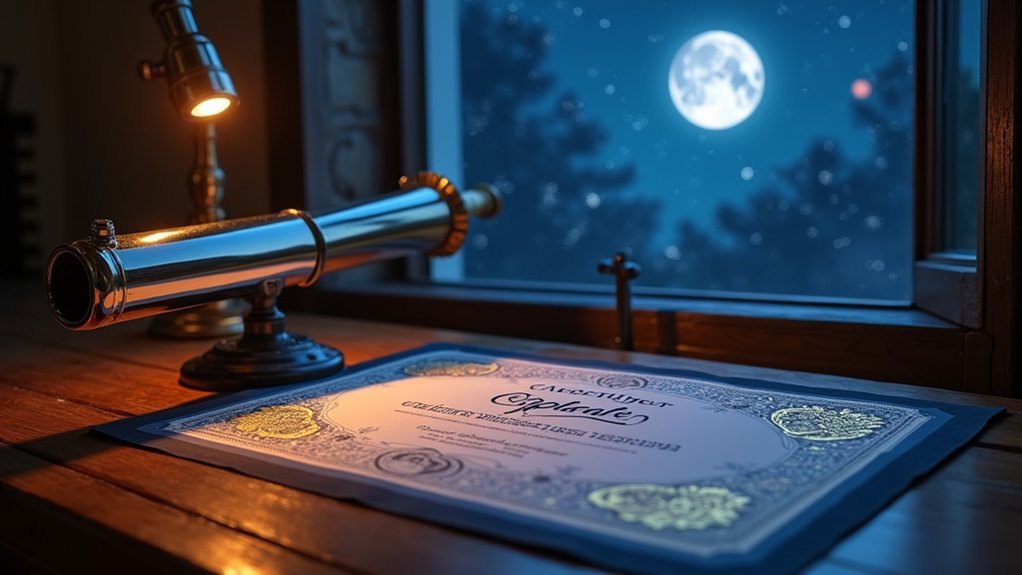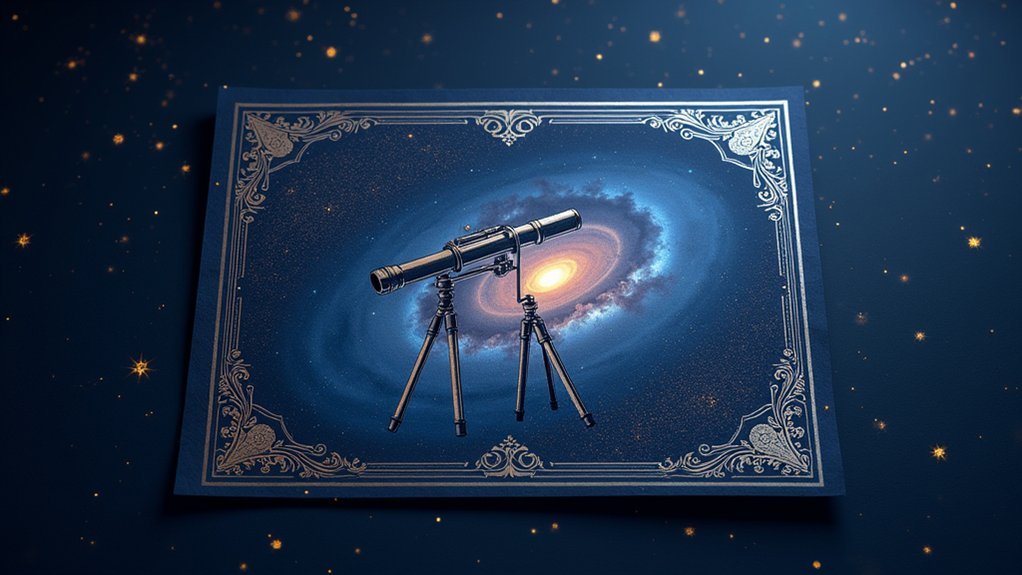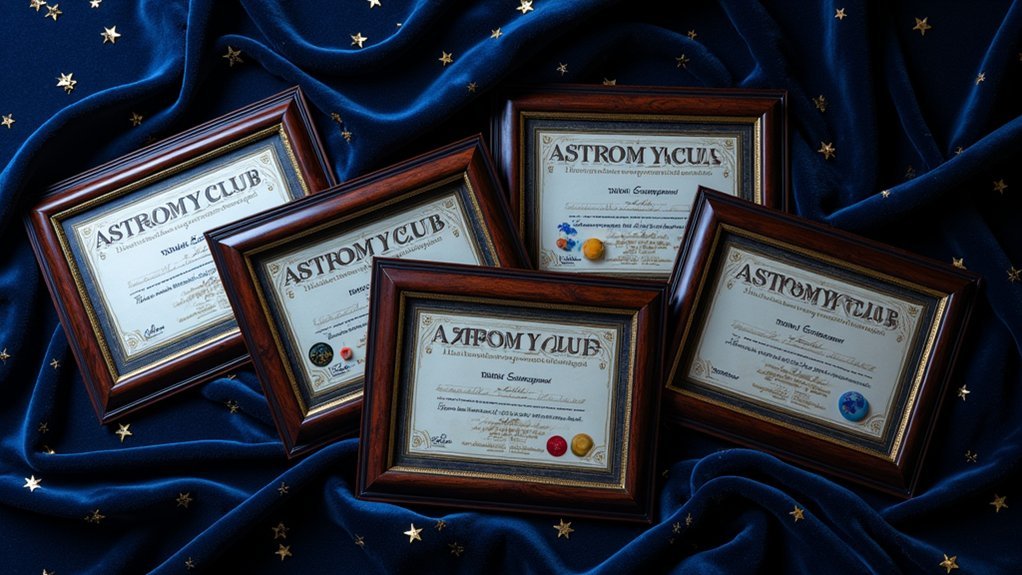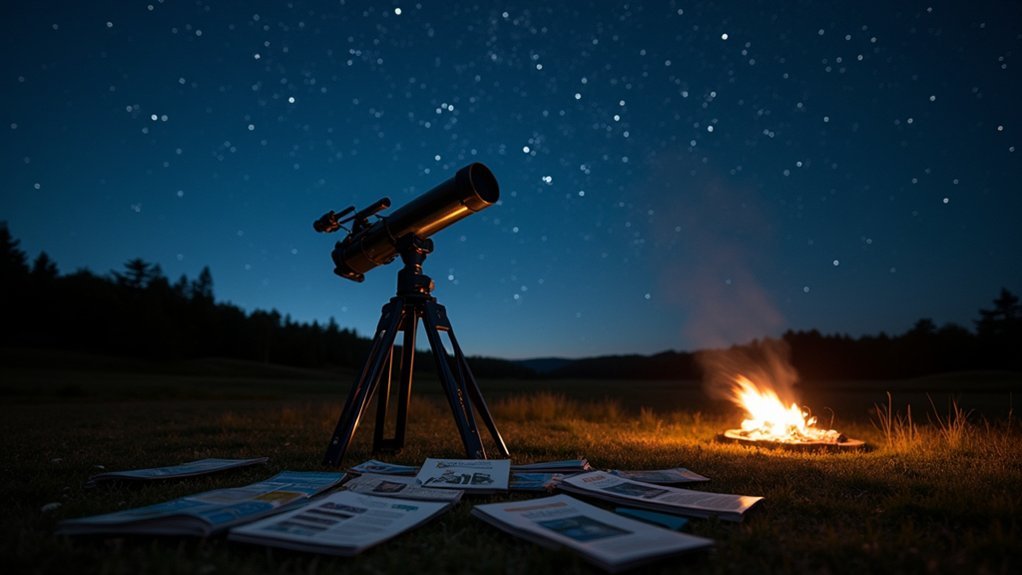Popular astronomy club certificates include the First Light Certificate (celebrating your first telescope observation), Constellation Master (recognizing identification of 10-20 constellations), Lunar Explorer (documenting moon studies), Solar System Voyager (tracking planetary observations), and Messier Marathon Participant (challenging you to spot deep sky objects). These certificates transform casual stargazing into structured achievements with clear goals and skill progression. Each award offers you both personal satisfaction and connection to the broader astronomy community.
First Light Certificate: Celebrating Your First Telescope Observation

When you first gaze through a telescope at the moon’s craters, Jupiter’s bands, or Saturn’s rings, you’re experiencing a moment worth commemorating.
The First Light Certificate captures this milestone in your astronomy journey, providing a personalized keepsake of your initial encounter with the cosmos.
This downloadable PDF allows you to record your name, observation date, and the celestial objects you viewed during your first telescope experience.
It’s more than just a certificate—it’s motivation for new stargazers to continue exploring the night sky.
Constellation Master Certificate: Recognizing Night Sky Pattern Recognition
The journey into astronomy continues beyond your first telescope observation with the Constellation Master Certificate, a recognition of your growing ability to read the night sky’s ancient patterns.
As a beginning stargazer, this achievement validates your dedication to learning the celestial roadmap that guides astronomers to deep-sky objects.
- You’ll typically identify 10-20 constellations, depending on your club’s requirements
- Your certificate becomes personalized with your name, achievement date, and observed constellations
- This recognition serves as your passport to more challenging astronomical pursuits
- The skills you develop will help you locate fascinating deep-sky objects within familiar patterns
The Constellation Master Certificate isn’t just a document—it’s evidence of your developing relationship with the night sky and your growing ability to navigate its vast wonders.
Lunar Explorer Certificate: Achievements in Moon Observation

Moonlit nights offer the perfect opportunity to earn your Lunar Explorer Certificate, a rewarding accomplishment that recognizes your dedication to observing our closest celestial neighbor.
This popular astronomy club credential allows you to document your journey across the lunar landscape by personalizing your certificate with specific features you’ve studied.
You’ll develop a deeper understanding of lunar geography as you identify craters, maria, and other distinctive formations throughout different phases. The certificate serves as both motivation and documentation of your growing expertise in moon observation.
Unlike other astronomy pursuits that require expensive equipment, lunar exploration is accessible to beginners with even modest telescopes.
As you track changes across lunar cycles, you’ll build skills that prepare you for exploring other stars and planets in our vast universe.
Solar System Voyager Certificate: Planetary Observation Milestones
Venturing beyond the moon, you’ll find the Solar System Voyager Certificate offers an exciting progression in your astronomical journey. This recognition celebrates your achievements in planetary observation, even when battling light pollution in urban areas.
You’ll personalize your certificate with your name, date, and the celestial bodies you’ve spotted through telescopes and binoculars.
- Track your progress as you check off each planet from your solar system bucket list
- Experience the satisfaction of direct observation rather than just viewing digital images
- Connect with fellow astronomy enthusiasts who share your passion for planetary observation
- Create a meaningful keepsake that documents your growth as an amateur astronomer
This certificate motivates you to continue exploring, transforming occasional stargazing into a purposeful adventure through our cosmic neighborhood.
Messier Marathon Participant Certificate: Your First Deep Sky Object Challenge

Stargazers ready for a greater challenge can earn the coveted Messier Marathon Participant Certificate by tackling your first deep sky object observations. This ambitious event invites you to observe all 110 Messier objects in a single night, from twilight to dawn.
Here’s what you need to know: The Marathon is scheduled during new moon phases to minimize light interference while observing galaxies and nebulae light years away.
Strategic planning is essential—you’ll navigate the night sky methodically to catch each object at its prime viewing position.
Navigation isn’t chance but necessity—plan your celestial route with precision to witness each Messier marvel at its perfect moment.
The Messier Marathon pushes your observational skills beyond casual stargazing, with some participants even attempting the additional Herschel Sprint challenge.
When completed, your certificate celebrates not just your technical achievement but your dedication to exploring deep sky wonders and connecting with fellow astronomy enthusiasts.
Frequently Asked Questions
What Are the High School Astronomy Awards?
You’ll find high school astronomy awards including certificates for observation achievements, recognition for research projects, Messier Marathon medals, science fair prizes, and special commendations for participating in significant astronomical events like eclipses.
How to Get Into Amatuer Astronomy?
You’ll want to start with binoculars, join a local astronomy club, use stargazing apps, and practice regularly. Don’t rush to buy expensive equipment—learn the night sky basics first through guided observations.
What to Do in a High School Astronomy Club?
You’ll enjoy stargazing events, guest speaker presentations, and hands-on telescope training in your high school astronomy club. Participate in community outreach programs and follow the structured curriculum to build your celestial navigation skills.
How Do I Find a Local Astronomy Club Near Me?
You’ll find local astronomy clubs by searching online with “astronomy club near me,” checking the Astronomical League website, contacting planetariums, joining astronomy groups on social media, or inquiring at universities and libraries.
In Summary
You’ve now got a clear path to track your astronomy journey from that exciting first light to conquering deep space objects. These five certificates won’t just hang on your wall—they’ll mark real achievements in your stargazing development. As you earn each one, you’ll build confidence, skills, and deeper appreciation for the night sky. Keep looking up; your cosmic adventure has just begun!




Leave a Reply